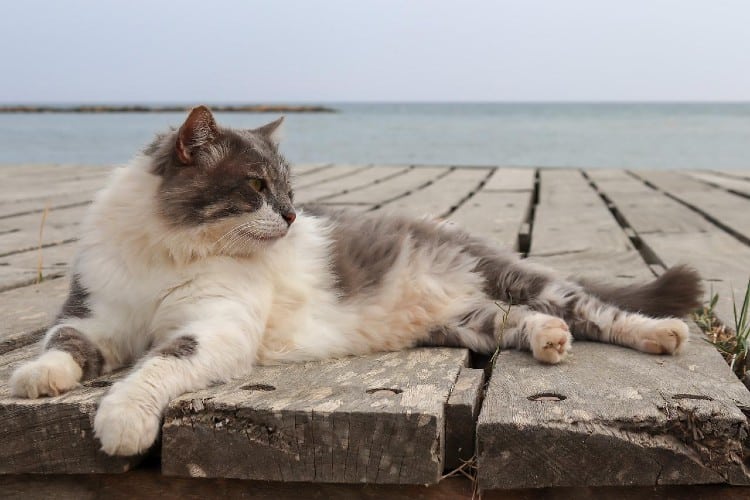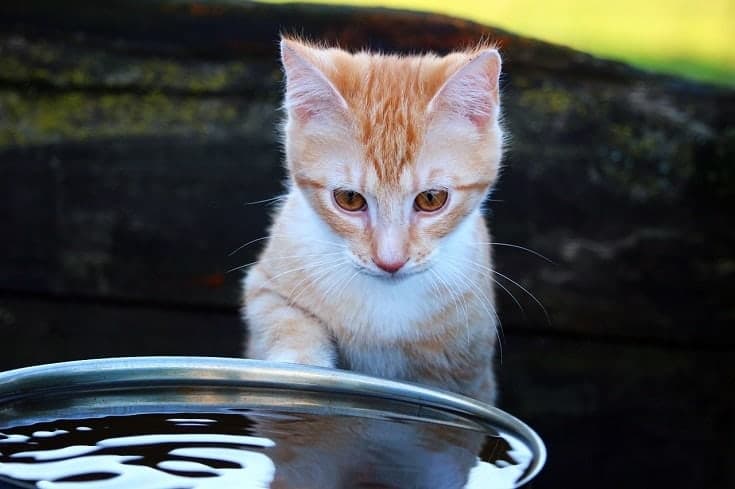Everyone knows cats don’t like water. In fact, most cats hate water and will do anything to avoid getting wet. There are several reasons why cats are afraid of water, some of which are scientific and others that are anecdotal. Here are the top five reasons why cats fear water:
The 5 Reasons Cats Are Afraid of Water
Here are the reasons, in a nutshell. We’ll explore each fear in-depth below.
- Their fur coat gets heavy and weighs them down
- They can’t see well while wet, and their whiskers get soggy
- Water is unfamiliar and unpredictable
- Being wet makes them feel vulnerable and exposed
- Many cats simply don’t like the sensation of being wet
1. Their Fur Doesn’t Repel Water Well
Cats have fur that is not very good at repelling water. They have a naturally oily fur coat that helps protect them from the elements and keeps them warm. When they get wet, this oil is stripped away, and their fur becomes matted and difficult to groom. When their fur gets wet, it takes a long time to dry off and can be very uncomfortable for them.
2. They Don’t Know How to Swim
Most cats don’t know how to swim and are afraid of getting in over their heads. If a cat falls into water, they may panic and not be able to get out. This can lead to them drowning. If your cat can’t swim and falls into water by accident, they may never want to go near it again.
3. Water is Unfamiliar Territory
Cats are creatures of habit and they like things to be familiar. For cats, water is an unknown quantity. It’s something they don’t encounter often in their everyday lives, so it’s natural for them to be wary of it. Water can also be very unpredictable. A small puddle on the floor can be just as dangerous
4. They Don’t Like the Way It Feels
Some cats simply don’t like the sensation of being wet and will do everything they can to avoid it. Water is wet and slippery, which can be weird and uncomfortable for cats. They may not like the way it feels on their fur or skin. Wet fur can also be very heavy and make it hard for them to move around.
5. It’s Just Not Natural
Cats are natural predators and they are built for hunting on land, not in water. Water is an unfamiliar environment for them and they may not feel comfortable in it. Cats also have a natural instinct to avoid anything that could potentially harm them. For cats, water is a foreign substance that they may not understand and be afraid of.

Do Some Cats Like Water?
While most cats are afraid of water, there are some cats that actually like it. These cats are usually the exception, not the rule, but it’s not hard to find a cat who loves the water. Their distant cat relatives in the wild, like tigers, are excellent swimmers, so it’s not much of a stretch.
Can Cats Swim?
While most cats don’t know how to swim, all cats are born with the ability to do so. This is because they have a layer of fat under their skin that helps them float. However, this does not mean that all cats can swim well.
Some cats may be able to paddle their legs and keep their head above water, but others may not be able to do this. It really depends on the cat and their individual abilities.
If your cat falls into water, don’t assume they will be able to swim to safety. Always be there to help them out if they need it.
Do Cats Lose Heat When They’re Wet?
Cats are able to regulate their body temperature very well, so being wet does not cause them to lose heat. In fact, cats can even tolerate being in cold water for a short period of time.
However, being wet for a long time can be uncomfortable for cats and may cause them to become cold. This is why it’s important to dry off your cat as soon as possible if they get wet.
Can Getting Wet Cause A Respiratory Infection In Cats?
A cat can get a respiratory infection if they are exposed to cold water or wet conditions for a long period of time. This is because their lungs can become irritated and inflamed. If you think your cat may be sick, take them to the vet as soon as possible.
Signs of a respiratory infection in cats include:
- Sneezing
- Coughing
- Wheezing
- Difficulty breathing
- Increased respiratory rate
- Increased heart rate
- Fever
If your cat is showing any of these signs, it’s important to take them to the vet right away. A respiratory infection can be serious and even life-threatening if not treated promptly.
Do I Need To Give My Cat Baths?
Most cats do not need to be bathed, as they are able to groom themselves very well. In fact, bathing a cat too often can actually strip their fur of natural oils, which can make it dry and brittle.
If your cat gets into something difficult to clean off, such as oil or grease, you may need to bathe them. Always use a mild, unscented shampoo on your cat and avoid getting water in their ears and eyes.
Cats that do need baths include show cats, long-haired cats, and cats with medical conditions that prevent them from grooming themselves properly.

Can I Help My Cat Feel More Comfortable Around Water?
There are a few things that can be done to help your cat feel more comfortable around water.
1. Use positive reinforcement.
If your cat seems afraid of water, try using positive reinforcement to help them feel more comfortable. Give them treats or pet them when they approach the water. You can also try putting a drop of essential oil on their paw so they associate the scent with something positive.
2. Make sure the water is not too cold or too hot.
Cats are sensitive to temperature changes, so make sure the water is not too cold or too hot. You can test the temperature with your hand to make sure it is comfortable for your cat.
3. Introduce them to the water gradually.
Never force your cat into the water. Instead, start by placing their paw in the water and letting them get used to the sensation. You can then move on to wetting their fur and finally letting them submerge themselves.
4. Have patience.
Never force your cat into the water. Instead, start by letting them see and smell the water. Then, try putting their paw in the water and see how they react. If they seem uncomfortable, stop and try again another day. Some cats will never like water, no matter what you do. It is important to have patience and not get frustrated with your cat. Each cat is different and will respond differently to training.
5. Keep them safe.
Even if your cat doesn’t like water, there are still ways to keep them safe around it. If you have a pool or pond in your yard, make sure it is fenced off so your cat can’t fall in. Always supervise your cat when they are around water.
Tips For Drying Off a Wet Cat
If your cat does get wet, there are a few things you can do to help them dry off quickly and safely.
1. Use a towel.
Gently rub your cat with a towel to help remove the water from their fur. Be careful not to rub too hard, as this may hurt your cat.
2. Use a hairdryer.
Set the hairdryer on the lowest setting and hold it about a foot away from your cat. Gently move the hairdryer back and forth as you dry off their fur. Never put the hairdryer directly on your cat, as this could hurt them.
3. Give them a warm place to rest.
Once your cat is dry, give them a warm place to rest. This can be a sunny spot in your house or a heated pet bed.
4. Check for signs of hypothermia.
If your cat was wet for a long time, they may be suffering from hypothermia. Signs of hypothermia in cats include:
- Shivering
- Lethargy
- Weakness
- Decreased heart rate
- Trouble breathing
- If your cat is showing any of these signs, take them to the vet immediately. Hypothermia can be very dangerous and even life-threatening.
5. Brush their fur.
Once your cat is dry, brush their fur to help remove any knots or tangles. Brushing will also help distribute their natural oils and keep their fur healthy.
Cats and Water: The Bottom Line
Most cats are afraid of water and don’t like being in it. There are several reasons for this, including the fact that their fur doesn’t repel water well and they don’t know how to swim. While some cats do like water, it is not common. If you have a cat that does like water, you should take steps to keep them safe around it.
Featured Image Credit: Pixabay
















